Midweek in Macau
An article in the New York Times business section on August 28th caught my eye, not because I follow the trends in the casino industry, but because it was about Macau, a pimple at the mouth of the Pearl River in Southern China that is a one-hour ferry ride from Hong Kong. I had arrived in Hong Kong two days earlier with no itinerary of than to recover from an illness and was open to suggestion.
The article announced the opening of the Venetian Macau Resort, a US$2.4 billion project that developers (i.e., the Las Vegas Sands Corporation) are betting will be mark the beginning of a major transformation of Macau's gambling culture and economy, a transformation they hope will once and for all turn the former Portuguese colony into the Las Vegas of Asia. I had not planned on visiting Macau, but after reading the article I was curious. Was Macau already the Vegas of the East? Could I play poker there? Was there more to Macau than buffets and baccarat?
Macau, like Hong Kong, is a Special Administrative Region of the People's Republic of China (SAR). The long and short of the term is that Macau and Hong Kong are administered independently (independent of Beijing, that is), but are still part of China. Americans don't need a Chinese visa to visit Hong Kong or Macau, but I did pass through immigration and receive stamps in my passport when I entered and exited both SARs.
Before China resumed control of Macau in 1999, it was, for hundreds of years, a Portuguese colony. The influence of the Portuguese remains today. Mediterranean architecture lines cobblestone lanes, street signs are written in Chinese and Portuguese and there is an abundance of Portuguese restaurants. The inhabitants of Macau -- not including the millions of tourists who visit annually -- are still predominantly Chinese in appearance and heritage. Outside of the casinos and tourist districts, it feels like Asia.
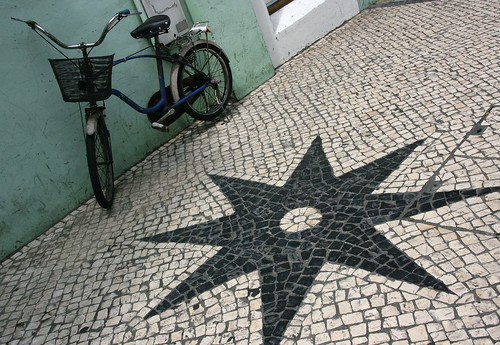
Old World Charm
After months spent in Southeast Asia I was overjoyed to sit down to a bowl of caldo verde, a Portuguese kale soup thickened with potatoes and spiced with slices of meaty chorizo. I also enjoyed a large bowl of tender octopus drowning in a rich stew of rice, tomatoes and garlic. I wanted to try the African Chicken and the tamarind pork, but somehow wasn't able to fit them in between meals of Chinese noodle soup, good old fashioned fish 'n' chips (with a pint o' Guinness to boot!) and another round of succulent sushi.
As good as the food was, the most refreshing hour I spent in Macau was at the Macau Art Museum. It's been a while since I've been to a museum worth writing about. In fact, I think the only museums I've written about on this tour were those in Canberra, Australia, back in February. The Macau Art Museum is a housed in a modern building on the waterfront, part of the larger Macau Cultural Center complex. The museum features five floors of exhibition space, enough for a a good blend of rotating exhibits. It's a shame that during the two hours I spent there, there were only five or six other visitors, all of them Europeans. After all, no one goes to Macau for the art.
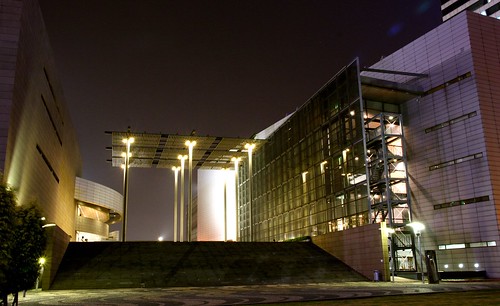
Museu de Arte de Macau
On the day I visited the musuem, I was relieved to discover there's more to work of the French photographer Robert Doisneau than variations on a big wet kiss. But his photographs capture the spirit of of mid-century Paris, from boys clowning in the streets to glimpses of high society that reminded me of Weegee's brushes with New York's glitzier inhabitants. I almost skipped the exhibit, thinking it would consist of nothing but romantic cliche. I'm happy I didn't. I wonder if Doisneau ever felt like the songwriter who was remembered for one snappy pop song while the rest of his body of work went ignored.
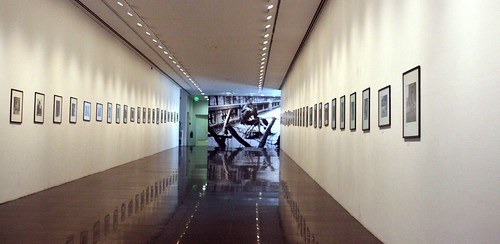
Robert Doisneau Exhibit
The Macau Art Museum also hosted "Edictus Ridiculum," a spectacular collection of paintings by a Russian artist named Konstantin Bessmertny. As far as I can tell, Bessmertny has never been shown in the U.S., which is a shame. His paintings, which on the surface can appear quite crude, offer absurdist commentary on his adopted home of Macau. There is humor, vitality, intelligence and a good old poke in the eye of societies high and low in each of his works.
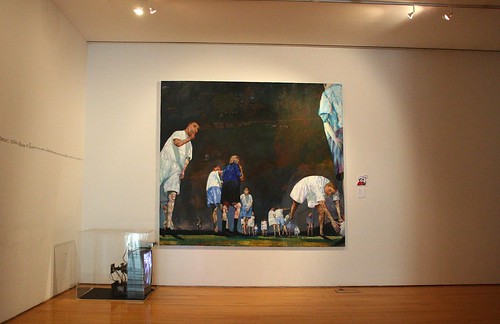
Konstantin Bessmertny Painting
So yes, there was more to Macau than gambling. There's food and art. There are traces of an Old World European culture in a Chinese society sprinting into the 21st century (does everyone have a cell phone grafted to the side of the head or does it just seem that way?). There's sightseeing and shopping and even a black-sand beach. But like I said, nobody comes to Macau for the art. They come to gamble, and gamble they do.
The city is infested with construction. If there's a casino in operation, there's another one going up next door. Every view is obstructed by a construction crane or a hole in the ground. Whether the city can support more and more casinos in the long-term remains to be seen. Today, however, they are open 24 hours and busload after busload of Chinese tourists fills the tables for games of chance.
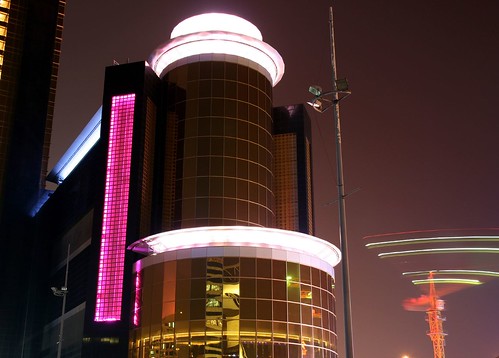
New School: Sands Casino
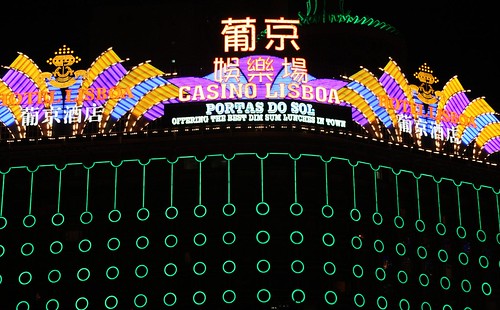
Old School: Casino Lisboa
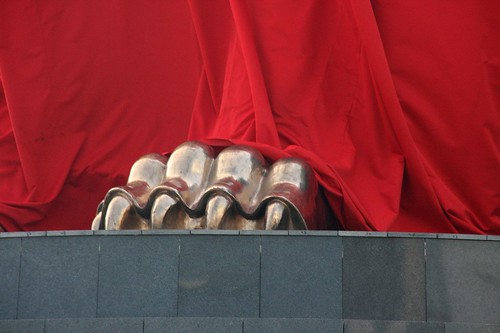
Does Macau's Future Have Claws?
The feeling I came away with is that Macau has not reached the level or sophistication (or sleaze) of Las Vegas. There's still a provincial feeling to the scene - it's probably closer to Atlantic City than to Las Vegas. The lounge acts are a tacky blend of lackluster dance moves and bad karaoke. There is nothing approaching kitsch, nothing that makes a visit to a casino an ironic experience. It's all about the gaming and the shopping. The American casinos are trying to inject life into the experience by establishing hotel/casino/resort destinations. The newest, the Venetian, replicates the Vegas experience with an enormous casino, a luxury shopping center, sports arena, convention center and indoor gondola rides. Hotel rooms start at HK$1500 a night (US$200) so I wasn't able to check out anything other than the casino. What I saw, however, was so similar to what I've seen in Vegas that checked my passport to make sure the stamp really said "Macau."
The Venetian is the first in what's intended to be 14 interlocking hotels. If China continues to grow its economy, I think it's a good bet that those 14 resorts will be filled each and every weekend with rambling, gambling Chinese.
The Times reports that last year Macau surpassed Las Vegas in the total amount of money gambled. I haven't been to Las Vegas in 15 years. The last time I was there, I spent a long evening on the $2 blackjack tables. In Macau, the minimum bet, whatever the game, is HK$100 (US$12.85). The majority of the tables, however, require a minimum bet of HK$200, with a few going as high as HK$300. There are also, of course, rows and rows and rows of one-armed bandits, which you can play for as little as 10 cents (US$.01).
I'm was hoping to find a game of Texas Hold 'Em, assuming that the game's jargon would translate to Chinese quite easily. The only poker variation I found in the gaming halls in five casinos, three owned by Americans, two by the Chinese, was Caribbean Stud Poker. Most of the casino real estate was taken over by Baccarat and the Chinese dice game Sic bo (I can't say whether the Chuck-a-luck variation was being played). There were also roulette wheels and something called Casino War, which is really a simple game of high card wins.
I settled for Blackjack, winning for a few hours then losing it all again. Casinos are profitable because the odds are always in the house's favor. The attraction is not winning, but the lure of a big win. I only lost as much as I was willing to lose (according to a conversation I had with myself before entering the casinos). However, the experience of being of of the few (if not the only) white face in the room was worth the price of admission. I spent an hour at a table at the Sands with a group of four old Chinese ladies, eagerly trading chips and betting on one another's hands. The woman sitting next to me would slap the felt with an open palm, her heavy silver ring sounding a clunk in the cheap wooden table, whenever she got excited. She would yell "Pie Cha! Pie Cha!" when she wanted a face card on the draw. I thought she was shouting in her native tongue until I realized the Chinese call face cards "picture cards" and she was yelling "Picture! Picture!" The games were run entirely in Chinese, leaving me at an occasional linguistic disadvantage. Not enough to contribute to losing though, that was all in the nature of the game.
I'm still looking for a game of Texas Hold 'Em. I think a trip to Vegas is in the cards. Pun intended.
Flickr Photoset: Macau (99 photos)
The article announced the opening of the Venetian Macau Resort, a US$2.4 billion project that developers (i.e., the Las Vegas Sands Corporation) are betting will be mark the beginning of a major transformation of Macau's gambling culture and economy, a transformation they hope will once and for all turn the former Portuguese colony into the Las Vegas of Asia. I had not planned on visiting Macau, but after reading the article I was curious. Was Macau already the Vegas of the East? Could I play poker there? Was there more to Macau than buffets and baccarat?
Macau, like Hong Kong, is a Special Administrative Region of the People's Republic of China (SAR). The long and short of the term is that Macau and Hong Kong are administered independently (independent of Beijing, that is), but are still part of China. Americans don't need a Chinese visa to visit Hong Kong or Macau, but I did pass through immigration and receive stamps in my passport when I entered and exited both SARs.
Before China resumed control of Macau in 1999, it was, for hundreds of years, a Portuguese colony. The influence of the Portuguese remains today. Mediterranean architecture lines cobblestone lanes, street signs are written in Chinese and Portuguese and there is an abundance of Portuguese restaurants. The inhabitants of Macau -- not including the millions of tourists who visit annually -- are still predominantly Chinese in appearance and heritage. Outside of the casinos and tourist districts, it feels like Asia.

After months spent in Southeast Asia I was overjoyed to sit down to a bowl of caldo verde, a Portuguese kale soup thickened with potatoes and spiced with slices of meaty chorizo. I also enjoyed a large bowl of tender octopus drowning in a rich stew of rice, tomatoes and garlic. I wanted to try the African Chicken and the tamarind pork, but somehow wasn't able to fit them in between meals of Chinese noodle soup, good old fashioned fish 'n' chips (with a pint o' Guinness to boot!) and another round of succulent sushi.
As good as the food was, the most refreshing hour I spent in Macau was at the Macau Art Museum. It's been a while since I've been to a museum worth writing about. In fact, I think the only museums I've written about on this tour were those in Canberra, Australia, back in February. The Macau Art Museum is a housed in a modern building on the waterfront, part of the larger Macau Cultural Center complex. The museum features five floors of exhibition space, enough for a a good blend of rotating exhibits. It's a shame that during the two hours I spent there, there were only five or six other visitors, all of them Europeans. After all, no one goes to Macau for the art.

On the day I visited the musuem, I was relieved to discover there's more to work of the French photographer Robert Doisneau than variations on a big wet kiss. But his photographs capture the spirit of of mid-century Paris, from boys clowning in the streets to glimpses of high society that reminded me of Weegee's brushes with New York's glitzier inhabitants. I almost skipped the exhibit, thinking it would consist of nothing but romantic cliche. I'm happy I didn't. I wonder if Doisneau ever felt like the songwriter who was remembered for one snappy pop song while the rest of his body of work went ignored.

The Macau Art Museum also hosted "Edictus Ridiculum," a spectacular collection of paintings by a Russian artist named Konstantin Bessmertny. As far as I can tell, Bessmertny has never been shown in the U.S., which is a shame. His paintings, which on the surface can appear quite crude, offer absurdist commentary on his adopted home of Macau. There is humor, vitality, intelligence and a good old poke in the eye of societies high and low in each of his works.

So yes, there was more to Macau than gambling. There's food and art. There are traces of an Old World European culture in a Chinese society sprinting into the 21st century (does everyone have a cell phone grafted to the side of the head or does it just seem that way?). There's sightseeing and shopping and even a black-sand beach. But like I said, nobody comes to Macau for the art. They come to gamble, and gamble they do.
The city is infested with construction. If there's a casino in operation, there's another one going up next door. Every view is obstructed by a construction crane or a hole in the ground. Whether the city can support more and more casinos in the long-term remains to be seen. Today, however, they are open 24 hours and busload after busload of Chinese tourists fills the tables for games of chance.



The feeling I came away with is that Macau has not reached the level or sophistication (or sleaze) of Las Vegas. There's still a provincial feeling to the scene - it's probably closer to Atlantic City than to Las Vegas. The lounge acts are a tacky blend of lackluster dance moves and bad karaoke. There is nothing approaching kitsch, nothing that makes a visit to a casino an ironic experience. It's all about the gaming and the shopping. The American casinos are trying to inject life into the experience by establishing hotel/casino/resort destinations. The newest, the Venetian, replicates the Vegas experience with an enormous casino, a luxury shopping center, sports arena, convention center and indoor gondola rides. Hotel rooms start at HK$1500 a night (US$200) so I wasn't able to check out anything other than the casino. What I saw, however, was so similar to what I've seen in Vegas that checked my passport to make sure the stamp really said "Macau."
The Venetian is the first in what's intended to be 14 interlocking hotels. If China continues to grow its economy, I think it's a good bet that those 14 resorts will be filled each and every weekend with rambling, gambling Chinese.
The Times reports that last year Macau surpassed Las Vegas in the total amount of money gambled. I haven't been to Las Vegas in 15 years. The last time I was there, I spent a long evening on the $2 blackjack tables. In Macau, the minimum bet, whatever the game, is HK$100 (US$12.85). The majority of the tables, however, require a minimum bet of HK$200, with a few going as high as HK$300. There are also, of course, rows and rows and rows of one-armed bandits, which you can play for as little as 10 cents (US$.01).
I'm was hoping to find a game of Texas Hold 'Em, assuming that the game's jargon would translate to Chinese quite easily. The only poker variation I found in the gaming halls in five casinos, three owned by Americans, two by the Chinese, was Caribbean Stud Poker. Most of the casino real estate was taken over by Baccarat and the Chinese dice game Sic bo (I can't say whether the Chuck-a-luck variation was being played). There were also roulette wheels and something called Casino War, which is really a simple game of high card wins.
I settled for Blackjack, winning for a few hours then losing it all again. Casinos are profitable because the odds are always in the house's favor. The attraction is not winning, but the lure of a big win. I only lost as much as I was willing to lose (according to a conversation I had with myself before entering the casinos). However, the experience of being of of the few (if not the only) white face in the room was worth the price of admission. I spent an hour at a table at the Sands with a group of four old Chinese ladies, eagerly trading chips and betting on one another's hands. The woman sitting next to me would slap the felt with an open palm, her heavy silver ring sounding a clunk in the cheap wooden table, whenever she got excited. She would yell "Pie Cha! Pie Cha!" when she wanted a face card on the draw. I thought she was shouting in her native tongue until I realized the Chinese call face cards "picture cards" and she was yelling "Picture! Picture!" The games were run entirely in Chinese, leaving me at an occasional linguistic disadvantage. Not enough to contribute to losing though, that was all in the nature of the game.
I'm still looking for a game of Texas Hold 'Em. I think a trip to Vegas is in the cards. Pun intended.
Flickr Photoset: Macau (99 photos)



0 Comments:
Post a Comment
<< Home